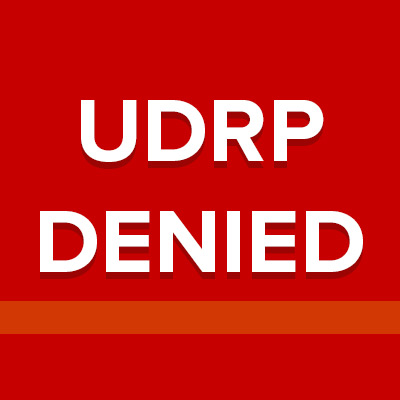
UDRP has been denied.
Three strikes for Clearbank; the British financial organization lost its 3rd UDRP case that it filed since last October. The bank operates from Clear.Bank and states that it spent more than 500,000 British pounds in 2018 to advertise its brand.
First came the loss for Clearbank.com, a decision that delivered a victory for its registrant. The case was defended by ESQwire.com.
Note: ESQwire is a premium sponsor of DomainGang.
Then came the decision for Clearbank.co, and another loss for the Complainant.
The third strike involves the domain Clearbank.net that was also denied. Simply put, the domain’s registration predates the formation date of Clearbank, and the sole panelist at the WIPO stated just that:
In the present case, the only information available about the registration of the disputed domain name is that it was first created with the Registrar on February 18, 2013. That is roughly two years before the Complainant was founded in 2015 and almost three years before the Complainant applied to register its trademark as a European Union Trademark (which, on the record in this case, is the Complainant’s earliest trademark registration).
Final decision: deny transfer of the domain Clearbank.net to the Complainant. Full details of this decision follow:
Copyright © 2025 DomainGang.com · All Rights Reserved.WIPO Arbitration and Mediation Center
ADMINISTRATIVE PANEL DECISION
ClearBank Limited v. Mark Mayo
Case No. D2018-24831. The Parties
The Complainant is ClearBank Limited of London, United Kingdom of Great Britain and Northern Ireland (“United Kingdom”), represented by Lawdit Solicitors, United Kingdom.
The Respondent is Mark Mayo of Manila, Philippines, self-represented.
2. The Domain Name and Registrar
The disputed domain name <clearbank.net> is registered with GoDaddy.com, LLC (the “Registrar”).
3. Procedural History
The Complaint was filed with the WIPO Arbitration and Mediation Center (the “Center”) on October 31, 2018. On October 31, 2018, the Center transmitted by email to the Registrar a request for registrar verification in connection with the disputed domain name. On November 1, 2018, the Registrar transmitted by email to the Center its verification response confirming that the Respondent is listed as the registrant and providing the contact details.
The Center verified that the Complaint satisfied the formal requirements of the Uniform Domain Name Dispute Resolution Policy (the “Policy” or “UDRP”), the Rules for Uniform Domain Name Dispute Resolution Policy (the “Rules”), and the WIPO Supplemental Rules for Uniform Domain Name Dispute Resolution Policy (the “Supplemental Rules”).
In accordance with the Rules, paragraphs 2 and 4, the Center formally notified the Respondent of the Complaint, and the proceedings commenced on November 6, 2018. In accordance with the Rules, paragraph 5, the due date for Response was November 26, 2018. The Respondent submitted two informal email communications on November 7 and 13, 2018. Upon the Complainant’s request, on November 16, 2018, the proceeding was suspended until December 16, 2018 pursuant to the Rules, paragraph 17. The Parties did not reach a settlement. Accordingly, the proceeding was reinstituted on December 18, 2018 and the Parties were notified that the new due date for Response was December 28, 2018. The Respondent did not submit any formal Response. Accordingly, the Center notified the Parties on January 2, 2019 that it would proceed to panel appointment.
The Center appointed Warwick A. Rothnie as the sole panelist in this matter on January 15, 2019. The Panel finds that it was properly constituted. The Panel has submitted the Statement of Acceptance and Declaration of Impartiality and Independence, as required by the Center to ensure compliance with the Rules, paragraph 7.
On January 29, 2019, the Panel issued Procedural Order No. 1 pursuant to paragraph 12 of the Rules seeking further information about the date the Respondent became the registrant of the disputed domain name and providing a revised timetable for supplemental filings and submission of the decision. In the event, neither Party provided any further information in response to the Procedural Order.
4. Factual Background
The Complainant is a clearing bank. It was incorporated in 2015. It was the first new clearing bank approved in the United Kingdom in more than 250 years.
The Complainant’s principal domain name is <clear.bank>. Since it became operational, there have been more than 60,000 unique visitors to the website at that domain. In 2017, the Complainant’s advertising spend was GBP 388.964. By the time the Complaint was filed, the Complainant’s advertising spend in 2018 was GBP 538.669.
The Complainant has numerous registered trademarks for relevant goods and services. These include:
– European Union Registered Trademark No. 015011141 for “ClearBank” in respect of relevant services in International Classes 35, 36, 38, 42, and 45. This trademark was filed on January 18, 2016 and registered on May 30, 2016;
– United States Registered Trademark No. 5,174,439 for “ClearBank” in respect of relevant services in International Classes 35, 36, 38, 42, and 45. This trademark was filed on January 18, 2016 and registered on April 4, 2017;
– United States Registered Trademark No. 5,231,286 for “ClearBank” in respect of relevant goods in International Class 9. This trademark was filed on August 9, 2016 and registered on June 27, 2017;
– United States Registered Trademark No. 5,231,287 for “Clear.Bank” in respect of relevant goods in International Class 9. This trademark was filed on August 9, 2016 and registered on June 27, 2017.
According to the Registrar, the disputed domain name was first registered with it on February 18, 2013. The Registrar is unable, or unwilling, to provide details of when the Respondent first became the registrant. The Registrar has disclosed, however, that the WhoIs record for the disputed domain name was last updated on March 2, 2018.
When the Complaint was filed, the disputed domain name redirected to a website at <orcestra.net> which offers digital banking solutions. The use of the disputed domain name has not changed.
5. Discussion and Findings
Paragraph 4(a) of the Policy provides that in order to divest the Respondent of the disputed domain name, the Complainant must demonstrate each of the following:
(i) the disputed domain name is identical or confusingly similar to a trademark or service mark in which the Complainant has rights; and
(ii) the Respondent has no rights or legitimate interests in respect of the disputed domain name; and
(iii) the disputed domain name has been registered and is being used in bad faith.
A. Identical or Confusingly Similar
Disregarding the generic Top Level Domain “.net” as a functional component of the domain name system, the disputed domain name is identical to a number of the Complainant’s registered trademarks; e.g., European Union Trademark No. 015011141 and United States Registered Trademark No. 5,174,439.
Accordingly, the Complainant has established the first requirement under the Policy.
B. Registered and Used in Bad Faith
Under the third requirement of the Policy, the Complainant must establish that the disputed domain name has been both registered and used in bad faith by the Respondent. These are conjunctive requirements; both must be satisfied for a successful complaint: see, e.g., Burn World-Wide, Ltd. d/b/a BGT Partners v. Banta Global Turnkey Ltd, WIPO Case No. D2010-0470.
Generally speaking, a finding that a domain name has been registered and is being used in bad faith requires an inference to be drawn that the respondent in question has registered and is using the disputed domain name to take advantage of its significance as a trademark owned by (usually) the complainant.
In the present case, the only information available about the registration of the disputed domain name is that it was first created with the Registrar on February 18, 2013.
That is roughly two years before the Complainant was founded in 2015 and almost three years before the Complainant applied to register its trademark as a European Union Trademark (which, on the record in this case, is the Complainant’s earliest trademark registration).
The Complainant relies on the fact that the disputed domain name redirects to what may be regarded as a competitive supplier of digital banking services and the fame of the Complainant’s trademark to claim that the disputed domain name has been registered and used in bad faith.
These matters may be indicia of use in bad faith under the Policy. However, the Complaint does not address how the disputed domain name could have been registered in bad faith when it was registered some two years before the Complainant was founded.
As noted above, the Panel sought further information about the basis of the Complainant’s claim, but the Complainant did not provide any further information.
It is possible that the last recorded update to the WhoIs record corresponds with the date the Respondent became the registrant. However, there are other plausible explanations for that change in the WhoIs record.
There are circumstances where a finding of registration in bad faith can be made where the domain name has been registered before a complainant formally acquired its trademark rights. See, e.g., WIPO Overview of WIPO Panel Views on Selected UDRP Questions, Third Edition (“WIPO Overview 3.0”), section 3.8.2.
In the absence of evidence pointing to the existence of some such circumstance or that the Respondent became the registrant of the disputed domain name at some point after the creation date of the disputed domain name recorded in the WhoIs record, however, there does not appear to be a basis for finding that the disputed domain name has been registered in bad faith. See, e.g., WIPO Overview 3.0 section 3.8.1. That is especially the case when the disputed domain name was registered before the Complainant was even founded.
In these circumstances, therefore, the Complainant has failed to establish that the disputed domain name was registered in bad faith. Accordingly, the Complaint must fail.
C. Rights or Legitimate Interests
As the Complaint must fail, no good purpose would be served by considering this requirement under the Policy.
6. Decision
For the foregoing reasons, the Complaint is denied.
Warwick A. Rothnie
Sole Panelist
Date: February 18, 2019












